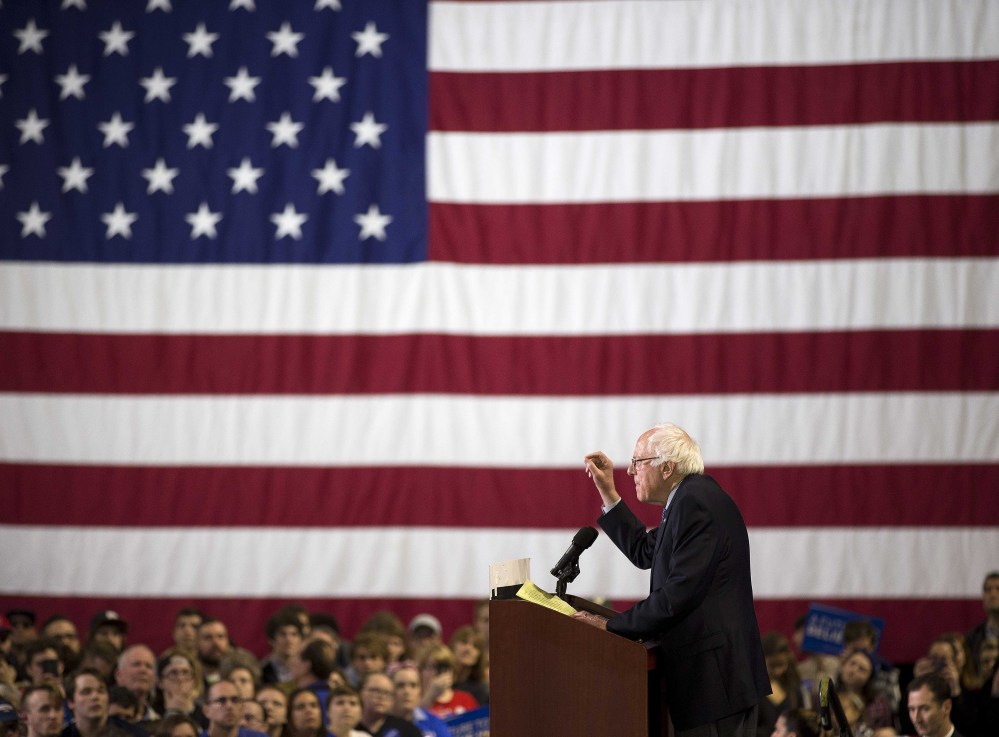Sparking a political revolution is a core premise of Bernie Sanders’ insurgent campaign, but so far there are few signs of it happening.
Compared to the last contested Democratic primary in 2008, party voter participation is down dramatically in the first three nominating contests. On Saturday, turnout fell by one-third-from about 118,000 to about 80,000-in the Nevada caucuses, according to Democratic Party estimates.
“I wish we had had a larger voter turnout,” Sanders admitted Sunday on NBC’s “Meet The Press.” “But by the way, we did phenomenally well with young people. I think we did well with working-class people.”
While Sanders essentially tied with Hillary Clinton in Iowa and won New Hampshire by double digits, Democratic turnout dropped 28 percent in the first contest and 13 percent in the second as compared to 2008 levels, when Barack Obama was in the race.
“I’m not sure there’s a formal definition of a revolution, but part of that would include increased participation,” said Ken Goldstein, a political science professor at the University of San Francisco and polling analyst for Bloomberg Politics. “[Sanders has] had success not so much in shaping and enlarging the electorate, but in performing well with those people who are voting in what has been lower turnout than in 2008.”
The drop in turnout is stinging for Sanders because it undermines a core pitch of his campaign. In stump speeches and debates, he regularly calls for a “political revolution” that gathers enough progressives to force Republicans in control of Congress to support bold goals like universal health care, a higher minimum wage and free college tuition.
Campaigning in New Hampshire late January, Sanders said voter participation was critical when asked how he’d get Republicans to support his agenda.
“This is what I mean by a political revolution,” Sanders said. “If the American people become activated, if the American people are prepared to stand up and say, ‘Yes, we’re gonna raise the minimum wage. Yes we’re gonna have paid family and medical leave. Yes, we’re gonna make public colleges and universities tuition free, etc. etc.’ And if people become activated you know what? The Republicans will listen. And you know why the Republicans will listen? Because if they don’t they’re gonna join the ranks of the unemployed.”
By contrast, he said, if voter turnout is low, as it was in the 2014 midterm elections, the GOP won’t be inclined to support those ideas. “Republicans are politicians. They listen,” he said. “If people are not paying attention, they will do the bidding of corporate America and the big money interests. But if they know that people are involved, yes they will do what is right, because if they don’t they will lose their jobs.”
The data show progressives to be less politically engaged during the 2016 Sanders campaign than they were during the 2008 campaign of President Barack Obama, whose biggest mistake, according to the Vermont senator, is that he didn’t keep progressives sufficiently mobilized while pushing his agenda. Sanders has vowed to do better.
The early data give some validation to rival Hillary Clinton’s more technocratic, but less inspirational message. She proposes to be an incrementalist, rather than a revolutionary. Instead of pushing goals like single-payer health care and breaking up the largest banks, she relies on a mix of more modest legislative proposals and executive actions to lower prescription drug costs and toughen regulations on financial institutions.
Obama’s rise to power exemplifies the towering obstacles to revamping politics in a deeply divided country. Lavished with massive crowds and a once-in-a-generation insurgency that powered him to a White House victory against the formidable Hillary Clinton in 2008, Obama’s progressive ambitions were stymied at every step of the way by implacable Republicans in Congress.
Republicans, meanwhile, have seen record turnout in their early contests of Iowa, New Hampshire and South Carolina, a trend that-if it holds-could indicate an empowered opposition facing a potential Sanders White House, especially if Republicans maintain control of the House of Representatives, as they are widely expected to do.
Unless Sanders proves he can outperform Obama when it comes to mobilizing voters in support of progressive goals, Sanders will have a hard time arguing he can succeed where the president failed.
For Sanders, there is still time to prove his point. After New Hampshire, his campaign spokesman Michael Briggs rejected as apples-to-oranges the turnout comparison to 2008, arguing that there were more candidates in that Democratic field early on. He posited that the turnout dynamic will change in later contests.
Sanders has his work cut out for him.
“Even though Sanders has certainly gotten large enthusiastic crowds,” Goldstein said, “he’s not Obama in 2008, and, quite frankly, he’s not [Donald] Trump in 2016.”
Nevertheless for Democrats, the new voters Sanders has inspired – particularly younger voters and those who feel trapped by a system rigged against them – could be a significant boon to the party, compared to what might have been if he hadn’t run.
David Knowles and Arit John contributed.
Send questions/comments to the editors.



Success. Please wait for the page to reload. If the page does not reload within 5 seconds, please refresh the page.
Enter your email and password to access comments.
Hi, to comment on stories you must . This profile is in addition to your subscription and website login.
Already have a commenting profile? .
Invalid username/password.
Please check your email to confirm and complete your registration.
Only subscribers are eligible to post comments. Please subscribe or login first for digital access. Here’s why.
Use the form below to reset your password. When you've submitted your account email, we will send an email with a reset code.